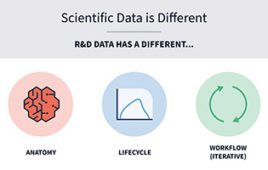Data driven precision medicine could empower the world’s providers to treat and potentially prevent virtually any disease, taking into account a person’s health information, environment and lifestyle.
While cancer patients are beginning to realize precision medicine’s power to accurately diagnose and treat many malignancies, cardiovascular disease— the number one cause of death globally—is just beginning to see precision medicine’s impact.
That’s because researchers now have the resources they need to cross-talk, mine big data and tackle unsolved problems. It’s this unprecedented access to not only data but also tools for making sense of the information and educational opportunities for how to conduct this new wave of research that makes cardiology ripe for precision medicine research.
Many are well-acquainted with the smart watches and smartphones that gather data on heart rate, exercise, stress and more. The next pivotal step is to educate researchers and clinicians about how to use the mountains of individualized health data to create algorithms that change the ways in which we predict, prevent, and treat heart attack, stroke, heart failure and more.
Overcoming research hurdles
Until recent years and even months, data science in cardiovascular and other diseases had been hampered by the willingness to trust, accept, and understand the paths to how data and new tools will change the face of medicine. Hurdles, including education, high cost, and equity access issues, have dominated the conversation.
We’ve also needed more buy-in from consumers. More than ever, patients and healthy consumers are participating in precision medicine research by volunteering to share their information. Today we are going a step further and working to establish these individuals as equal partners; meaning data and conversation is shared bi-directionally to enhance the transparency and ownership. As a result, people have a stronger impact and a voice in precision medicine research. The reality is that current technology makes it possible for individuals to monitor their own health and to share that data easily with health-based applications that utilize algorithms to better understand the causes of disease. That, in turn, leads to better prevention and personalized treatment for individuals.
Costs remain a hurdle in many types of research. Genetic sequencing, bioinformatics, data storage, as well as the costs of delivering more precise therapies to patients, are necessary and expensive elements of precision medicine research today. Although many of these costs are decreasing, the high pricetag of therapies immediately place these out of reach for many. For example, PCSK9 inhibitors, an injectable class of monoclonal antibodies, which has been shown to lower low-density lipoprotein (LDL) by as much as 60 percent when combined with a statin costs patients from $12,000 to $14,000 each year. Additional details not always apparent in the media include the courier delivery of these specialized drugs delivered to patients’ home via temperature-controlled conditions, putting these therapies out of reach for many around the world. In sum, equity remains an important yet unsolved challenge in precision therapies. But thanks to explosive leaps in technology and changes in data management around the globe, things that were perceived as hurdles just a few years ago, are becoming opportunities for researchers and clinicians.
Today’s opportunities
Scientists who want to help develop algorithms for cardiovascular data science, which include precision medicine, artificial intelligence (A.I.) and deep learning, have access to the tools they need to make the research a reality, including data access, training and funding with new data grants, as well as cloud computing resources, which can quickly analyze large datasets.
Cloud computer is among the standout advances for precision medicine researchers. It offers a powerful environment of analytical tools and state-of-the-art software to researchers who are analyzing large datasets for scientific insights. In the past, these researchers would download datasets onto personal computers or via their institutions’ supercomputers—both which have significant drawbacks.
The American Heart Association is joining the effort to integrate precision medicine research into cardiovascular care with the Precision Medicine Platform (Precision.heart.org), which is powered by Amazon Web Services. This cloud-based data resource gives scientists access to vast cardiovascular specific data, which can help the research community greatly accelerate research projects. The platform arms researchers with the tools they need to filter and analyze the data, making it meaningful. And it opens doors to collaboration and sharing with scientists, clinicians and consumers around the globe.
The initiative is funding researchers in several areas, including artificial intelligence and machine learning. To learn more, apply for research grants or to get involved, visit http://institute.heart.org/.
The reality
Data science is poised to enrich today’s clinical and scientific landscapes. While cardiovascular health and disease is a top area of need for this work, today’s cardiovascular disease data science researchers would not be confined to diseases of the heart and brain. Many of the greatest discoveries related to the prevention and treatment of heart diseases and stroke have come from the cross-talk and collaboration from other fields, such as neurology and oncology. Technology and data science make that global cross-talk much more possible, opening new avenues to solve unsolved problems.
Precision medicine in cardiology is just starting to move from basic gadgets, like smartphone heart rate measuring, to the recent news of a novel way to predict heart disease risk with machine learning using retina scans.
How might cardiovascular precision medicine research look like to today’s scientists? One example: A team of scientists aim to identify early risk predictors of stroke. The team requests access to all different types of data from across the globe that includes zipcodes, genetic, lifestyle, diet and wearable device information, and the recording of events including stroke. The data is stored in a secure workspace on the cloud for the team to collaboratively analyze in real-time utilizing artificial intelligence and leveraging the power and speed of cloud computing. Training the machine to “learn” or identify the data points that are associated with incidence of stroke is the goal. The power of technology and breaking down barriers to accessing data permits approaches like this to opening up the field to exploring many new possibilities.
Soon, data science researchers might solve hypertension treatment challenges, find more accurate ways to image hearts, determine who will and won’t respond to a medication and much, much more.
As an explosion of big data analytics in cardiovascular medicine and bioinformatics revolutionize patient care, we’ll need more clinicians to be bioinformatics-literate. That, too, is being addressed. Among the solutions are a groundswell of training opportunities specifically for the next generation of precision cardiovascular medicine physicians, including a clinical informatics fellowship and continuing medical education programs offered by physician organizations and industry.
With all these things in place, the time is now for precision medicine research in cardiovascular disease and stroke.
About the author: Jennifer L. Hall, Ph.D., chief of the American Heart Association’s Institute for Precision Cardiovascular Medicine, spends her days empowering next-generation researchers to find life changing, and lifesaving solutions. Hall completed postdoctoral fellowships at Stanford and Harvard Schools of Medicine, which focused on identifying genetic variants in cardiac disease, and she has led large-scale cardiovascular research projects funded by the National Institutes of Health, American Heart Association, National Science Foundation, Juvenile Diabetes Research Foundation, Robert Wood Johnson Foundation and the American Diabetes Association.




